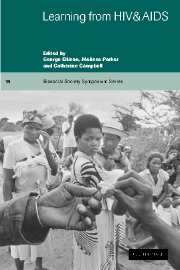Book contents
- Frontmatter
- Contents
- List of contributors
- Foreword by D. Clarke-Patel
- 1 Introduction. Learning from HIV and AIDS: from multidisciplinary to interdisciplinarity
- 2 HIV and the evolution of infectious diseases
- 3 The epidemiology of HIV/AIDS: contributions to infectious disease epidemiology
- 4 The influence of HIV/AIDS on demography and demographic research
- 5 What have clinicians learnt from working with HIV/AIDS? A medical perspective from London
- 6 How has the HIV/AIDS pandemic contributed to our understanding of behaviour change and health promotion?
- 7 Anthropological reflections on HIV prevention strategies: the case for targeting London's backrooms
- 8 An absence of anthropology: critical reflections on anthropology and AIDS policy and practice in Africa
- 9 A disaster with no name: the HIV/AIDS pandemic and the limits of governance
- 10 Postscript: reflections on HIV/AIDS and history
- Country index
- Subject index
- References
8 - An absence of anthropology: critical reflections on anthropology and AIDS policy and practice in Africa
Published online by Cambridge University Press: 14 January 2010
- Frontmatter
- Contents
- List of contributors
- Foreword by D. Clarke-Patel
- 1 Introduction. Learning from HIV and AIDS: from multidisciplinary to interdisciplinarity
- 2 HIV and the evolution of infectious diseases
- 3 The epidemiology of HIV/AIDS: contributions to infectious disease epidemiology
- 4 The influence of HIV/AIDS on demography and demographic research
- 5 What have clinicians learnt from working with HIV/AIDS? A medical perspective from London
- 6 How has the HIV/AIDS pandemic contributed to our understanding of behaviour change and health promotion?
- 7 Anthropological reflections on HIV prevention strategies: the case for targeting London's backrooms
- 8 An absence of anthropology: critical reflections on anthropology and AIDS policy and practice in Africa
- 9 A disaster with no name: the HIV/AIDS pandemic and the limits of governance
- 10 Postscript: reflections on HIV/AIDS and history
- Country index
- Subject index
- References
Summary
Introduction
Gilbert Herdt wrote way back in 1987 ‘thus far, anthropology has had minimal involvement in AIDS prevention and understanding’. He ended on a rhetorical note: ‘But, if we do not take up the challenge to discover and assist, who will?’ Surveying the field 16 years later, the answer in many ways seems to be more or less everyone –except anthropologists. This is not of course to say that anthropologists have not been involved in research on HIV/AIDS. They have, and there are useful surveys of their contribution (e.g. Akeroyd, 1997; Parker, 2001; Schoepf, 2001), but the initial impetus spearheaded in American anthropology by Herdt (1987) has not led to an established place for anthropologists in AIDS prevention, policy and care. At first glance, this might appear a little mystifying if one reads the policy statements of the World Health Organization (WHO) or UNAIDS that now advocate ‘bottom up’ approaches, collaboration, working with rather than against local practice, incorporating traditional healers into prevention programmes, and so on. Yet, just at the place where you might expect to find anthropologists, drawing upon their wealth of ethnographic understanding, translating local knowledge into terms comprehensible by policy makers and vice versa, we are notable by our absence. Indeed, anthropologists seem to be stranded outside the increasingly powerful coalition of interests that is represented in the AIDS industry.
This paper addresses this issue of the relative absence of anthropologists in the formulation of HIV/AIDS policy and research in Africa.
- Type
- Chapter
- Information
- Learning from HIV and AIDS , pp. 210 - 237Publisher: Cambridge University PressPrint publication year: 2003
References
- 8
- Cited by



